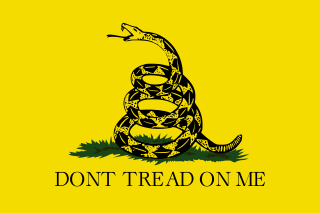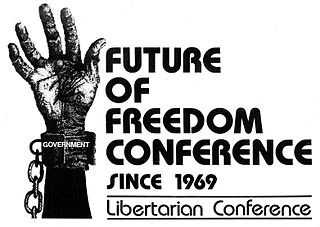Related Research Articles
Joseph Neil Schulman was an American novelist who wrote Alongside Night and The Rainbow Cadenza which both received the Prometheus Award, a libertarian science fiction award. His third novel, Escape from Heaven, was also a finalist for the 2002 Prometheus Award. His fourth and last novel, The Fractal Man, was a finalist for the 2019 Prometheus Award.
The libertarian perspective on immigration is often regarded as one of the core concepts of libertarian theory and philosophy. There is considerable disagreement among libertarians as to what stance towards immigration best accords with libertarian principles. Some hold that restrictions on immigration are an infringement of the rights of immigrants and other property owners and constitute a threat to individual liberty. Others maintain that open borders amount to a policy of forced integration on the part of the state, and that protecting the rights of property holders requires that present governments adopt much more discriminatory policies on who is allowed to enter a country.
Karl Hess was an American speechwriter and author. He was also a political philosopher, editor, welder, motorcycle racer, tax resister, and libertarian activist. His career included stints on the Republican right and the New Left before embracing a mix of left-libertarianism and laissez-faire anarcho-capitalism, a term which is attested earliest in his 1969 essay "The Death of Politics". Later in life, he summed up his role in the economy by remarking "I am by occupation a free marketer ."

Market anarchism, also known as free-market anti-capitalism, is the branch of anarchism that advocates a free-market economic system based on voluntary interactions without the involvement of the state. A form of individualist anarchism, and libertarian socialism, it is based on the economic theories of mutualism and individualist anarchism in the United States.

Agorism is a social philosophy that advocates creating a society in which all relations between people are voluntary exchanges by means of counter-economics, engaging with aspects of nonviolent revolution. Agorism has similar elements to anarcho-capitalism, but unlike some anarcho-capitalists, most agorists are strictly opposed to voting as a strategy for achieving their desired outcomes. It was first proposed by American libertarian philosopher Samuel Edward Konkin III (1947–2004) at two conferences, CounterCon I in October 1974 and CounterCon II in May 1975.

A night-watchman state, or minarchy, whose proponents are known as minarchists, is a model of a state that is limited and minimal, whose functions depend on libertarian theory. Right-libertarians support it only as an enforcer of the non-aggression principle by providing citizens with the military, the police, and courts, thereby protecting them from aggression, theft, breach of contract, fraud, and enforcing property laws.
Abstention is a term in election procedure for when a participant in a vote either does not go to vote or, in parliamentary procedure, is present during the vote but does not cast a ballot. Abstention must be contrasted with "blank vote", in which a voter casts a ballot willfully made invalid by marking it wrongly or by not marking anything at all. A "blank voter" has voted, although their vote may be considered a spoilt vote, depending on each legislation, while an abstaining voter has not voted. Both forms may or may not, depending on the circumstances, be considered to be a protest vote. Abstention is related to political apathy and low voter turnout.

Samuel Edward Konkin III, also known as SEK3, was a Canadian-American left-libertarian philosopher and Austrian school economist. As the author of the publication New Libertarian Manifesto, he was a proponent of a political philosophy he named agorism.
Left-libertarianism, also known as left-wing libertarianism, or social libertarianism, is a political philosophy and type of libertarianism that stresses both individual freedom and social equality. Left-libertarianism represents several related yet distinct approaches to political and social theory. Its classical usage refers to anti-authoritarian varieties of left-wing politics such as anarchism, especially social anarchism, communalism, and libertarian Marxism, collectively termed libertarian socialism. A portion of the left wing of the green movement, including adherents of Murray Bookchin's social ecology, are also generally considered left-libertarian.

Alongside Night is a dystopian novel by science fiction writer J. Neil Schulman intended to articulate the principles of Agorism, a political philosophy created by Samuel Edward Konkin III, to whom Schulman dedicated the work. It was first published during 1979 by Crown Publishers, with subsequent paperback editions released by Ace Books during 1982, Avon Books during 1987, Pulpless.com during 1999, and Amazon Kindle during 2009.
Libertarianism is a political philosophy that upholds liberty as a core value. Libertarians seek to maximize autonomy and political freedom, and minimize the state's encroachment on and violations of individual liberties; emphasizing the rule of law, pluralism, cosmopolitanism, cooperation, civil and political rights, bodily autonomy, freedom of association, free trade, freedom of expression, freedom of choice, freedom of movement, individualism, and voluntary association. Libertarians are often skeptical of or opposed to authority, state power, warfare, militarism and nationalism, but some libertarians diverge on the scope of their opposition to existing economic and political systems. Various schools of libertarian thought offer a range of views regarding the legitimate functions of state and private power. Different categorizations have been used to distinguish various forms of Libertarianism. Scholars distinguish libertarian views on the nature of property and capital, usually along left–right or socialist–capitalist lines. Libertarians of various schools were influenced by liberal ideas.

In the United States, libertarianism is a political philosophy promoting individual liberty. According to common meanings of conservatism and liberalism in the United States, libertarianism has been described as conservative on economic issues and liberal on personal freedom, often associated with a foreign policy of non-interventionism. Broadly, there are four principal traditions within libertarianism, namely the libertarianism that developed in the mid-20th century out of the revival tradition of classical liberalism in the United States after liberalism associated with the New Deal; the libertarianism developed in the 1950s by anarcho-capitalist author Murray Rothbard, who based it on the anti-New Deal Old Right and 19th-century libertarianism and American individualist anarchists such as Benjamin Tucker and Lysander Spooner while rejecting the labor theory of value in favor of Austrian School economics and the subjective theory of value; the libertarianism developed in the 1970s by Robert Nozick and founded in American and European classical liberal traditions; and the libertarianism associated with the Libertarian Party, which was founded in 1971, including politicians such as David Nolan and Ron Paul.
Counter-economics is an economic theory and revolutionary method consisting of direct action carried out through the black market or the gray market. As a term, it was originally used by American libertarian activists and theorists Samuel Edward Konkin III and J. Neil Schulman. The former defined it as the study or practice "of all peaceful human action which is forbidden by the State".
Right-libertarianism, also known as libertarian capitalism, right-wing libertarianism, or colloquially as libright, is a libertarian political philosophy that supports capitalist property rights and defends market distribution of natural resources and private property. The term right-libertarianism is used to distinguish this class of views on the nature of property and capital from left-libertarianism, a type of libertarianism that combines self-ownership with an egalitarian approach to natural resources. In contrast to socialist libertarianism, right-libertarianism supports free-market capitalism. Like most forms of libertarianism, it supports civil liberties, especially natural law, negative rights, the non-aggression principle, and a major reversal of the modern welfare state.
Libertarian manifesto may refer to the following political manifestos:
Libertarian Party Radical Caucus is a caucus formed in 2006 within the United States Libertarian Party by Susan Hogarth and other party members who opposed removal of much of the material in the party platform during the 2006 national party convention. The caucus generally subscribes to an ideology of anarcho-capitalism. The caucus was active at the 2008 and 2010 Libertarian National Conventions. The radical caucus was revived and was extraordinarily active during the 2016 Libertarian National Convention.
This article is a list of major figures in the theory of libertarianism, a philosophy asserting that individuals have a right to be free. Originally coined by French anarchist and libertarian communist Joseph Déjacque as an alternative synonymous to anarchism, American classical liberals appropriated the term in the 1950s for their philosophy which asserts that individuals have a right to acquire, keep and exchange their holdings and that the primary purpose of government is to protect these rights. As a result of this history, libertarians on this list may be either of the American-style free-market variety or of the European-style socialist variety.
The following outline is provided as an overview of and topical guide to anarchism:

The Syndic is a 1953 science fiction novel by Cyril M. Kornbluth.

The Future of Freedom Conference is regarded as the first explicitly libertarian conference series ever held in the United States. Debuting in 1969, the conference's keynote speaker was Austrian economist Prof. Ludwig von Mises.
References
- 1 2 "New Libertarian Manifesto". Flag.Blackened.Net. Archived from the original on 2008-11-04.
- ↑ Konkin III, Samuel Edward. "Smashing the State for Fun and Profit Since 1969". Spaz.org. Retrieved 2008-10-14.